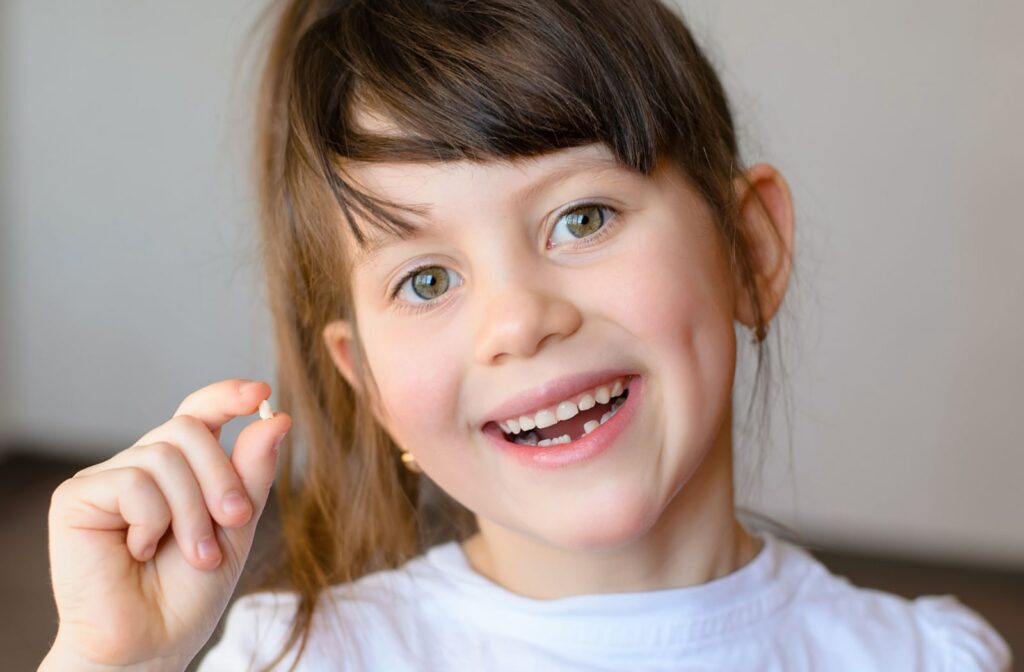Many concerns come with caring for your child’s oral health, with many milestones on the way. But before talking about orthodontics, you wonder when your child will start losing their baby teeth and when permanent teeth will begin to grow. You may have even already noticed a loose tooth!
Children will usually start losing their teeth around 6-8, but it’s different for each kid. It can be a sign that your child is getting older, and it’s an exciting time for them.
Although it can be anxiety-inducing, there are steps you can take to help your family maintain optimal oral health.
When Do Baby Teeth Fall Out?
Baby teeth, also known as primary teeth, usually start falling out between the ages of 6–8, but this can vary depending on the child. The first teeth to go are usually the two center teeth on the bottom jaw, followed shortly by the two upper center teeth. Over the next few years, they’ll lose their teeth going toward the back of the mouth.
This process continues until their permanent teeth have replaced all 20 baby teeth. Interestingly, the first teeth to come out, or erupt, are the molars behind your child’s baby teeth. These “first molars” appear just as their other teeth are beginning to loosen and don’t replace any of their baby teeth.
Usually, by the time your child is 13, they’ll have most of their permanent teeth.
What Can Cause Early Tooth Loss?
Genetics typically determine when exactly your child will start losing their teeth. Eventually, the growing permanent teeth weaken the baby teeth’s roots, causing them to fall out on their own or with a gentle wiggle.
However, certain health conditions or injuries can cause early tooth loss. Even though these baby teeth are temporary, they must be cared for. Early childhood tooth decay may cause pain, infection, or early tooth loss.
Like your permanent teeth, the plaque buildup on baby teeth can eventually cause the tooth’s enamel (the top layer) to soften and decay. Enamel damage could lead to cavities and other dental problems.
Get young children in the habit of caring for their dental health:
- Use a pea-sized amount of toothpaste and help your child brush
- Avoid sugary foods
- After eating any sugary or sticky food, rinse their mouth with water
- Change your child’s toothbrush regularly, especially if they were sick
Baby teeth help guide the permanent teeth into the correct space. If baby teeth fall out too early, it can cause the adult teeth to shift into the empty spot and cause crowding or affect their bite.
What Can Cause Delayed Tooth Loss?
On the opposite end of the spectrum, delayed tooth loss can also be a concern. While losing baby teeth too early can impact proper dental development, slow or delayed tooth loss can also indicate underlying health conditions or developmental issues.
Certain conditions like Down syndrome or cleft palate can cause delayed tooth eruption. Additionally, injuries or infections can also impact the growth and development of permanent teeth.
What to Do With a Loose Tooth
A loose tooth can be both exciting and confusing for your child. Talking with them openly and explaining how this experience is perfectly natural is a good first step. Here are some tips for handling your child’s loose tooth.
Don’t Pull the Tooth Yourself
Trying to pull the tooth out yourself may be tempting, but this could lead to unintended complications. The baby tooth’s root is slowly dissolving and being reabsorbed by the body, so trying to force it out can cause unnecessary pain.
Allow the tooth to come out naturally on its own time, and there should be minimal bleeding.
Encourage Them to Wiggle the Tooth
If your child’s tooth is loose but not yet ready to come out on its own, you can encourage them to wiggle it gently. This may help loosen it further and speed up the natural process.
Help Manage Their Pain
If your child is experiencing discomfort or pain, you can help them manage it by giving them over-the-counter pain medication like children’s ibuprofen, as recommended by their doctor. Alternatively, they can apply a cold compress to their cheek, which may help to numb the area.
Once the tooth fall outs, you might notice some minor bleeding. You must keep the area clean as the new tooth comes in. Clean the empty socket with sterile gauze or have them rinse their mouth with warm saltwater.
If the area doesn’t stop bleeding or the swelling won’t go down, contact your dentist.
Maintain Good Oral Hygiene
A loose tooth can be vulnerable to bacteria buildup, leading to gum disease and other complications. Ensure your child continues to brush their teeth twice a day, floss regularly, and rinse their mouth with water after meals. This may help prevent bacteria buildup and promote gum health.
Visit the Dentist
Regular dental appointments are one of the best ways to support your child’s oral health. A dentist can monitor their oral development and check for any potential issues.
The Canadian Dental Association recommends children have a dental exam every 6 months to watch for changes and catch minor problems early.
Dental Care For Everyone in Bond Head
While there’s no exact calendar for when children will start losing their baby teeth, knowing the signs to look out for is always helpful. It lets you know if everything is progressing as it should and if you need to take action on any problems.
At Hill Top Dental Centre, we understand every child’s dental journey is unique. If your child has a loose tooth, this is an excellent opportunity to schedule an appointment and have the tooth examined. Our team of experienced professionals is here to support them – and you – through this process of achieving a healthy, happy smile.



